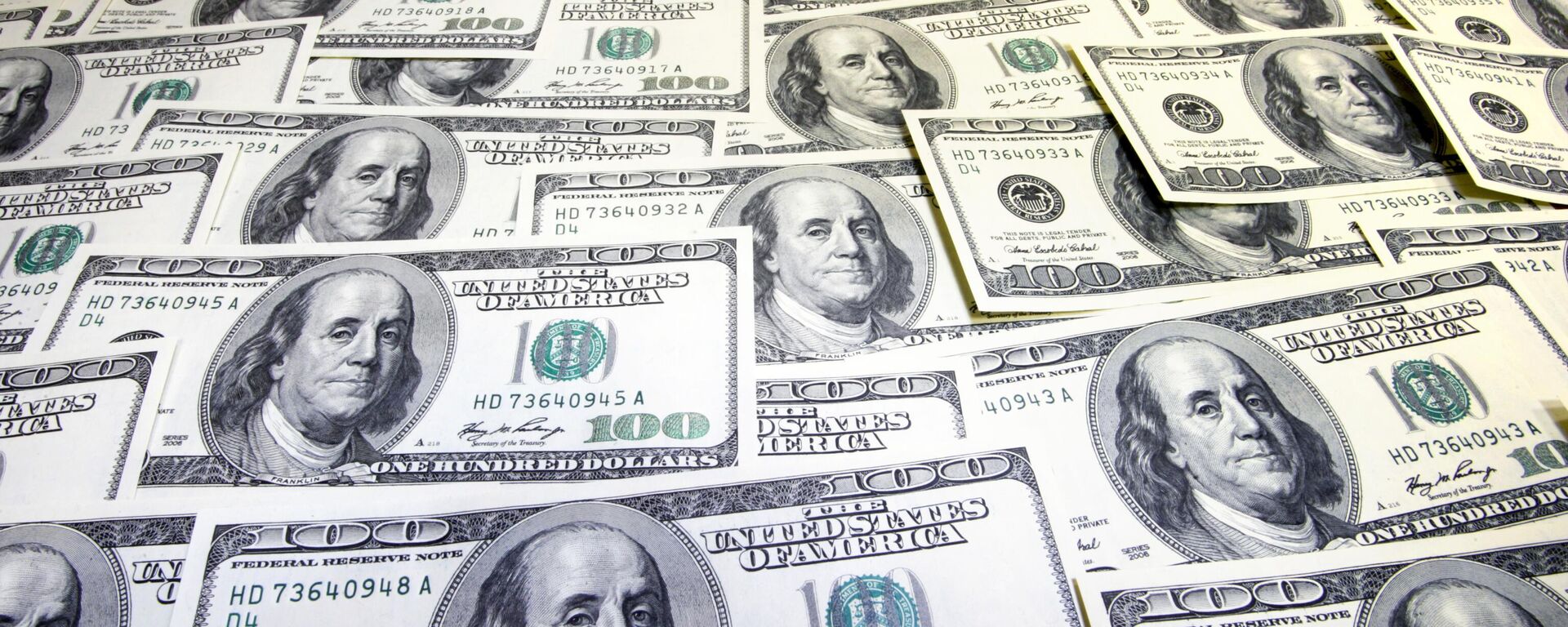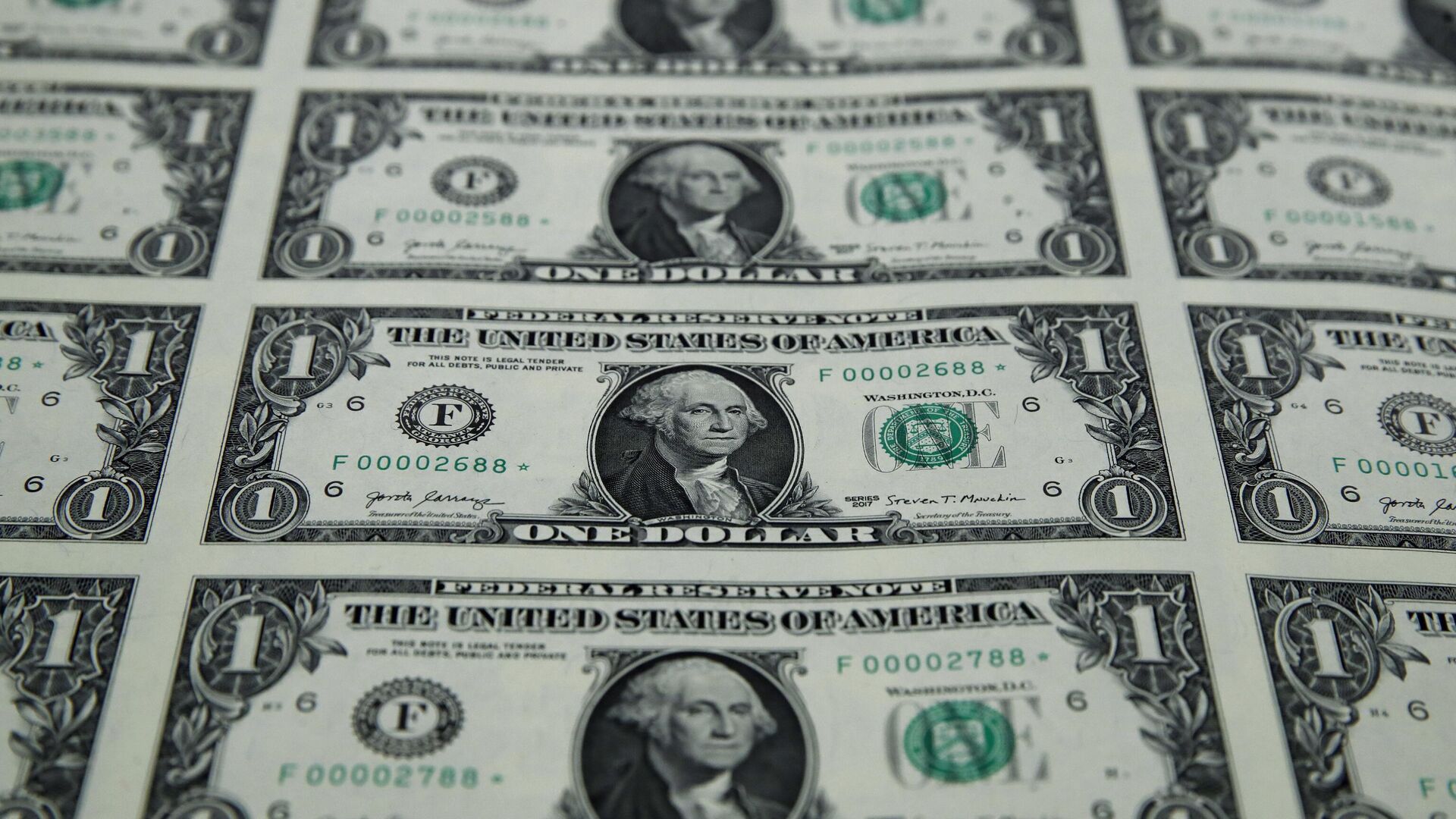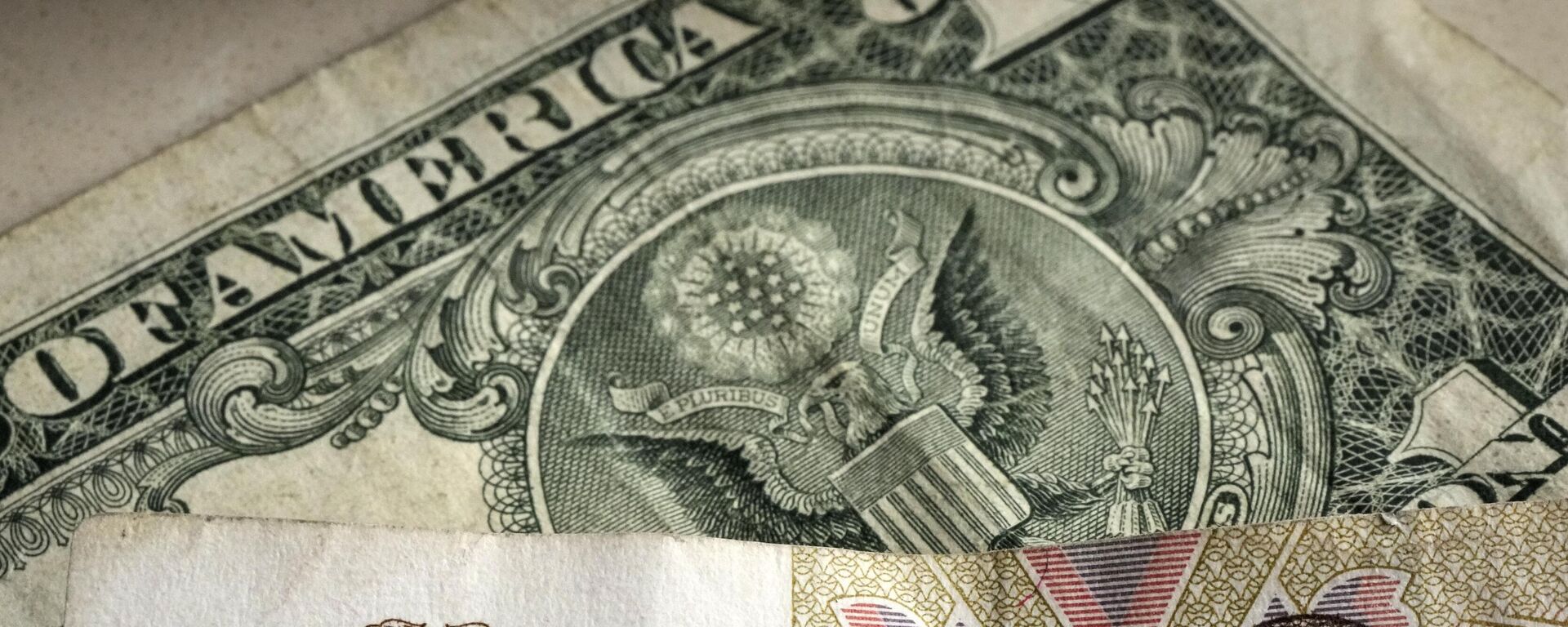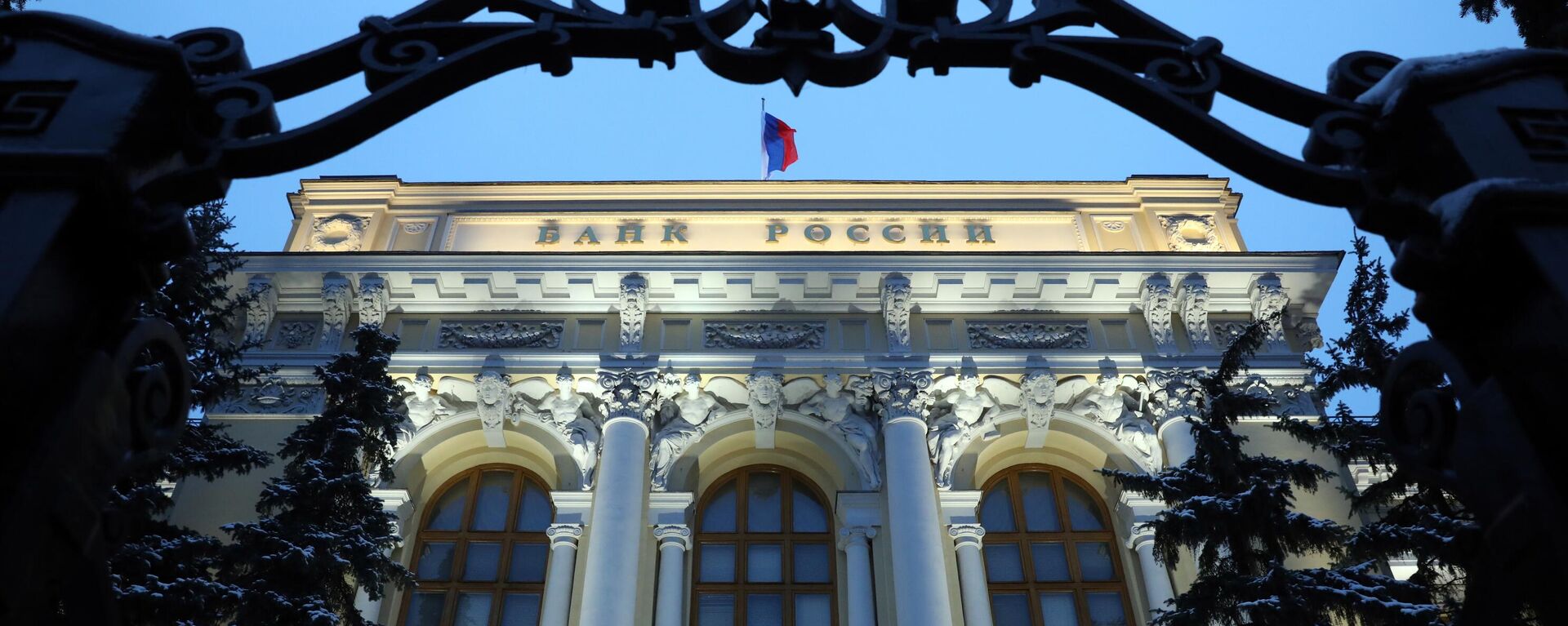https://sputnikglobe.com/20240613/dollars-role-diminishes-as-us-sanctions-boost-russias-yuan-trade-1118936321.html
Dollar's Role Diminishes as US Sanctions Boost Russia’s Yuan Trade
Dollar's Role Diminishes as US Sanctions Boost Russia’s Yuan Trade
Sputnik International
A new round of US sanctions targeting Russia's Moscow Exchange (MOEX), National Clearing Centre and National Settlement Depository will further undermine the dollar's role, Sputnik's pundits say.
2024-06-13T16:36+0000
2024-06-13T16:36+0000
2024-06-13T16:36+0000
economy
russia
moscow exchange
dedollarisation
opinion
business
united kingdom (uk)
france
national settlement depository (nsd)
us
https://cdn1.img.sputnikglobe.com/img/07e8/01/09/1116078135_0:160:3073:1888_1920x0_80_0_0_75cf253e3161861f09f2c2ff7b39ffe1.jpg
The US Treasury introduced a new round of sanctions against the Moscow Exchange (MOEX), the National Clearing Center (NCC) and the National Settlement Depository (NSD) on June 12 in a bid to shatter "the architecture of Russia’s financial system". The US government issued licenses to wind down operations with the MOEX, NSD and NCC until August 13, 2024. The UK followed suit on June 13.In the wake of the US Treasury move, the Russian Central Bank announced that exchange trading and settlements of deliverable instruments in US dollars and euros were to be suspended, adding that these operations would be continued "over-the-counter (OTC)," i.e. directly between Russian banks and their customers. The bank clarified to Russians that their foreign currency deposits remain secure despite sanctions.The Central Bank will use bank reporting and information coming from digital over-the-counter trading platforms to set the exchange rates. The regulator developed this alternative procedure back in October 2022, foreseeing possible sanctions against MOEX. Until recently, the official exchange rates of the dollar and euro were set on the basis of currency trading data from the Moscow Exchange.Despite Western headlines claiming that the Russian currency "swings to opaque trading territory," the ruble has not been weakened by the US measures. On the contrary, Kabakov expects that the recent changes will add to the ongoing gradual strengthening of the Russian currency.The latest round of sanctions are expected to further weaken the dollar's role in Russia's trade and boost the use of the Chinese currency, according to Kabakov. In 2023, the yuan replaced the US dollar as the most traded currency in Russia. In May, the share of the yuan in Russia's foreign exchange market reached a new high of 53.6 percent; it also increased by 1.3 percentage points in the over-the-counter market, up to 39.2 percent, compared to the previous month, according to the Russian Central Bank.The US Treasury has also warned about the risk of sanctions against third countries conducting financial operations with Russian companies and institutions. However, Western economists warn that the measure could further undermine the US dollar. US secondary sanctions "created an incentive [for third countries] to diversify away from the US dollar to avoid these sanctions when exporting to target countries such as Russia," Antoine Berthou, an economist at the Banque de France, wrote in his September 2023 research paper.Speaking to foreign journalists on June 5, Russian President Vladimir Putin pointed out that it wasn't Russia who kicked off the de-dollarization effort: actually, it was the US that is continuing to shoot itself in the foot by axing other countries' ability to trade in dollars and forcing world players to diversify away from the greenback.
https://sputnikglobe.com/20240613/russian-exporters-to-sell-foreign-currency-profits-in-dollars-through-banks---regulator-1118934734.html
https://sputnikglobe.com/20240612/bank-of-russia-to-use-banks-reports-to-determine-dollar-exchange-rate-1118928496.html
https://sputnikglobe.com/20240209/use-of-dollar-as-foreign-policy-struggle-tool-one-of-us-biggest-strategic-mistakes---putin-1116678123.html
russia
united kingdom (uk)
france
Sputnik International
feedback@sputniknews.com
+74956456601
MIA „Rossiya Segodnya“
2024
News
en_EN
Sputnik International
feedback@sputniknews.com
+74956456601
MIA „Rossiya Segodnya“
Sputnik International
feedback@sputniknews.com
+74956456601
MIA „Rossiya Segodnya“
us treasury sanctions against moex, no panic in russian market, russian central bank, moex suspended dollar and euro trade, russian regulators stabilize market, de-dollarization, us sanctions facilitate de-dollarisation, us secondary sanctions forces third parties to ditch dollars
us treasury sanctions against moex, no panic in russian market, russian central bank, moex suspended dollar and euro trade, russian regulators stabilize market, de-dollarization, us sanctions facilitate de-dollarisation, us secondary sanctions forces third parties to ditch dollars
Dollar's Role Diminishes as US Sanctions Boost Russia’s Yuan Trade
A new round of US sanctions targeting Russia's Moscow Exchange (MOEX), National Clearing Centre and National Settlement Depository will further undermine the dollar's role, Sputnik's pundits say.
The US Treasury introduced a new round of sanctions against the Moscow Exchange (MOEX), the National Clearing Center (NCC) and the National Settlement Depository (NSD) on June 12 in a bid to shatter "the architecture of Russia’s financial system".
The US government issued licenses to wind down operations with the MOEX, NSD and NCC until August 13, 2024. The UK followed suit on June 13.
"It was clear that [Russian] regulators were ready for this kind of solution. The Central Bank warned Russian banks in advance about how it would act. By and large, there is no surprise here," Nikita Maslennikov, head of finance and economics at the Institute of Contemporary Development and a leading expert at the Center for Political Technologies, told Sputnik.
In the wake of the US Treasury move, the Russian Central Bank announced that exchange trading and settlements of deliverable instruments in US dollars and euros were to be suspended, adding that these operations would be continued "over-the-counter (OTC)," i.e.
directly between Russian banks and their customers. The bank clarified to Russians that their foreign currency deposits remain secure despite sanctions.
"There had been a very unique situation in the Russian market due to the fact that the dollar and euro were traded on the Moscow Exchange," Yaroslav Kabakov, director of strategy at the investment company Finam, told Sputnik. "If we look at such platforms as NICE, NASDAQ, there is no currency trading there at all. And in this regard, trade and exchange operations [in Russia] will be carried out through banks, as they are carried out in many countries."
The Central Bank will use
bank reporting and information coming from digital over-the-counter trading platforms to set the exchange rates. The regulator developed this alternative procedure back in October 2022, foreseeing possible sanctions against MOEX. Until recently, the official exchange rates of the dollar and euro were set on the basis of currency trading data from the Moscow Exchange.
Despite Western headlines claiming that the Russian currency "swings to opaque trading territory," the ruble has not been weakened by the US measures. On the contrary, Kabakov expects that the recent changes will add to the ongoing gradual strengthening of the Russian currency.
"There is no panic," Kabakov said. "It is clear that yesterday we observed, at a time when there was no trading on the Moscow Exchange, certain actions on the part of individuals in over-the-counter trading; there were active sales there. Someone, on the contrary, by the way, bought shares. But today we do not observe any significant drawdown in the Moscow Exchange index, nor do we observe any global changes in terms of exchange rates."
The latest round of sanctions are expected to further weaken
the dollar's role in Russia's trade and boost the use of the Chinese currency, according to Kabakov. In 2023, the yuan replaced the US dollar as the most traded currency in Russia.
In May, the share of the yuan in Russia's foreign exchange market reached a new high of 53.6 percent; it also increased by 1.3 percentage points in the over-the-counter market, up to 39.2 percent, compared to the previous month, according to the Russian Central Bank.
"The share of the yuan, which now amounts to more than 50 percent on the Moscow Exchange, will probably be the main settlement currency for many transactions," the expert presumed.
The US Treasury has also warned about the risk of sanctions against third countries conducting financial operations with Russian companies and institutions. However, Western economists warn that the measure could further
undermine the US dollar. US secondary sanctions
"created an incentive [for third countries] to diversify away from the US dollar to avoid these sanctions when exporting to target countries such as Russia," Antoine Berthou, an economist at the Banque de France, wrote in his September 2023 research
paper.
Speaking to foreign journalists on June 5, Russian President Vladimir Putin pointed out that it wasn't Russia who kicked off the de-dollarization effort: actually, it was the US that is continuing to shoot itself in the foot by axing other countries' ability to trade in dollars and forcing world players to diversify away from the greenback.

9 February 2024, 01:00 GMT





